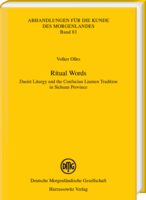|
|
more titles of the subject:
Download:
Please note: With adding digital Products to your cart
the payment will be handled via PayPal. The download will be provided after the payment is confirmed. The Qing dynasty scholar Liu Yuan (1768–1856) developed a unique system of thought, merging Confucian learning with ideas and practices from Daoism and Buddhism, and was eventually venerated as the founding patriarch of an influential movement combining the characteristics of a scholarly circle and a religious society. Liu Yuan, a native of Sichuan, was an outstanding Confucian scholar whose teachings were commonly referred to as Liumen (Liu School). Assisted by his close disciples, Liu edited a Daoist ritual canon titled Fayan huizuan (Compendium of Ritual Words). Daoist priests affiliated with the Liumen community and using the Fayan huizuan canon in their rituals constituted an independent liturgical branch of Daoism, which is still extant and known under the name of “Fayan tan” (Altar of Ritual Words).
Following a comprehensive description of the Liumen tradition, the volume by Volker Olles discusses the compilation history of the Fayan huizuan canon, the lineage of the Fayan tan priests, as well as the temporal framework of their liturgy. The main part of the volume consists of a detailed study of the ritual canon, identifying its textual sources and describing its pantheon, the influence of the Liumen ideology on its texts, as well as the function and performance of its rituals in contemporary religious practice. Furthermore concluding thoughts about the Fayan tan tradition’s role in present-day Sichuan constitute the epilogue. By showing how members of the Confucian elite were involved in the evolution of modern Daoism, this study sheds light on hitherto obscure or poorly understood aspects of the intellectual and spiritual culture of Southwest China. |
|||||||||||||||||||||||||||||||||||||||||






